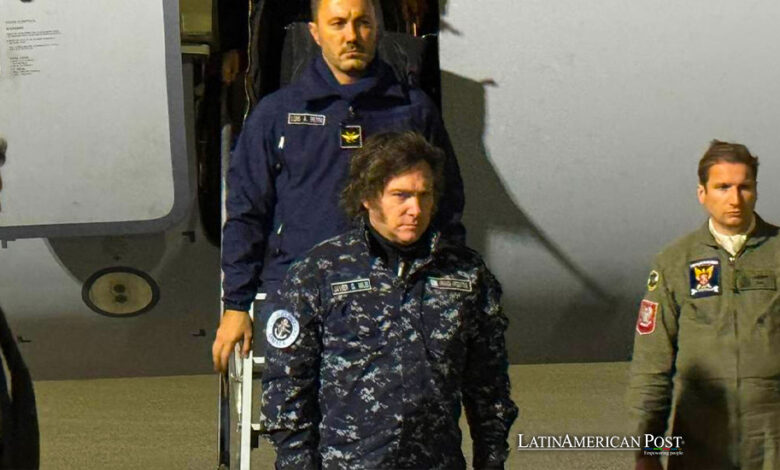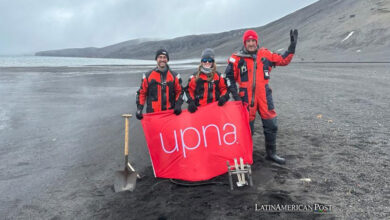Milei Positions Future U.S. Base in Argentina as Strategy to Reclaim Falklands

Argentine President Javier Milei’s announcement of a U.S. military base in Tierra del Fuego as part of a strategy to reclaim the Falkland Islands reflects a bold geopolitical shift, aligning closely with the U.S. and Israel and stirring Latin American diplomatic waters.
President Javier Milei recently disclosed plans to establish a United States military base in Tierra del Fuego in a move that underscores Argentina’s dramatic shift in its foreign policy stance. This decision is portrayed as a strategic maneuver to bolster Argentina’s claim over the Falkland Islands, currently under British control. Milei’s announcement has reverberated across Latin America, raising questions about the implications for regional diplomacy and Argentina’s long-standing territorial disputes.
Milei’s Vision for Diplomatic Evolution
In a comprehensive interview with Neura, Milei emphasized that this initiative represents a significant act of sovereignty, the largest in four decades. It links the military base in Ushuaia, Tierra del Fuego’s capital, to Argentina’s assertive stance on the Falklands and Antarctic territories. The Argentine president insists that reclaiming the Falklands should be pursued through diplomatic channels, suggesting a long-term strategy to alter the status quo established post-1982 Falklands War.
The decision to host a U.S. base, revealed during U.S. Southern Command’s General Laura Richardson’s visit to Argentina, is seen as a gateway to the Antarctic, aligning with Milei’s broader geopolitical vision. This move, however, is not without its controversies, particularly concerning the existing Chinese space station in Neuquén, which has faced scrutiny from the U.S. for alleged military purposes. Milei’s stance on conducting audits to address these concerns reflects a delicate balancing act in Argentina’s international relations.
Argentina’s Strategic Acquisitions
The acquisition of 24 F16 aircraft further signifies Argentina’s intent to strengthen its military capabilities and deepen ties with the United States and Israel. Milei’s decision to relocate the Argentine embassy to Western Jerusalem cements this realignment, dismissing security concerns by asserting Argentina’s position on the global stage and its choice to side with what he terms “the good.”
These developments resonate beyond Argentina, reflecting a changing geopolitical landscape in Latin America. Milei’s assertive foreign policy stance diverges from the region’s traditional diplomatic approaches to sovereignty disputes and international alliances. While countries like Brazil, Chile, and Mexico have maintained a cautious stance on contentious territorial and diplomatic issues, Argentina’s new direction under Milei signals a potential shift in the region’s power dynamics.
The Latin American context is crucial in understanding the implications of Milei’s actions. The region has a history of complex relationships with superpowers and former colonial rulers. Milei’s strategy may inspire other Latin American countries to reevaluate their foreign policy priorities, particularly concerning territorial claims and international partnerships.
Furthermore, Argentina’s pivot towards the U.S. and Israel could have ripple effects on its relations with other Latin American nations, many of which have diverse and sometimes conflicting interests in global diplomacy. For instance, Venezuela’s close ties with China and Cuba’s historical alignment with Russia contrast sharply with Milei’s pro-U.S. and pro-Israel stance, potentially leading to a realignment of diplomatic relationships within the region.
Evaluating Foreign Military Presence in Latin America
Milei’s approach also taps into broader debates about sovereignty, territorial rights, and the role of foreign military bases in Latin America. The presence of a U.S. base in Argentine territory is a contentious issue, reflecting the region’s sensitive history with foreign military interventions and the legacy of colonialism. This development could ignite discussions of national sovereignty and regional autonomy, with potential implications for Latin American solidarity and collective security mechanisms.
Also read: Argentine Nuns Challenge Clerical Abuse in Historic Verdict
President Javier Milei’s announcement of a U.S. military base in Tierra del Fuego as part of a strategy to reclaim the Falkland Islands marks a significant shift in Argentina’s foreign policy. This move impacts Argentina’s territorial ambitions and international alliances. It poses questions about the future of Latin American diplomacy, regional power dynamics, and the balance between national interests and global partnerships. As Argentina charts this new course, the reactions from regional neighbors and international powers will shape the evolving narrative of Latin American geopolitics.




